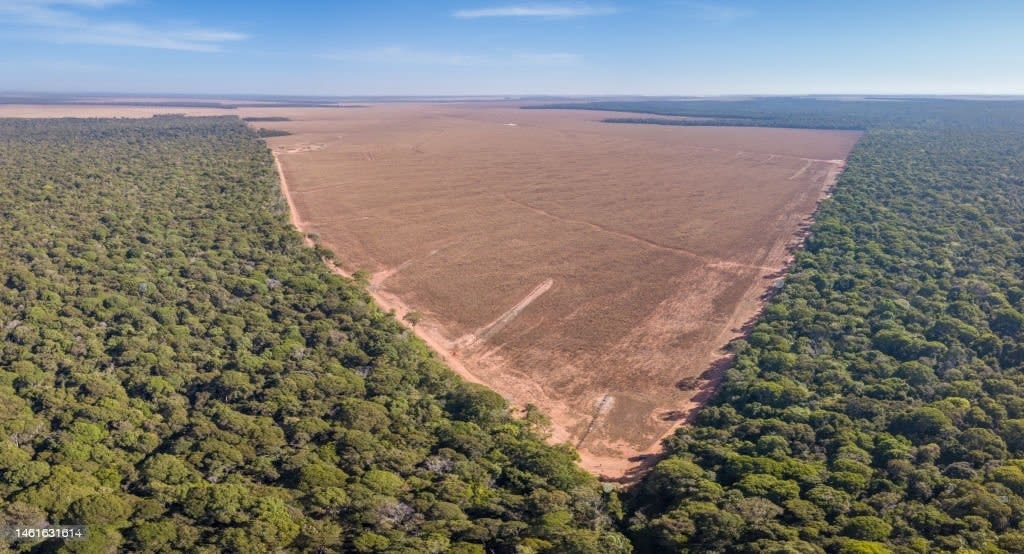The Domino Effect
How Deforestation Impacts the Food Chain of Tropical Birds

Deforestation, we often think, leads to the loss of habitat and subsequent decline in animal populations. While this is true, there's another aspect to deforestation that's less obvious but equally detrimental. It's a story of dominoes falling one after the other, resulting in the starvation of tropical birds. Surprisingly, these birds aren't directly impacted by the loss of trees or their food sources but by the disruption of a crucial service provided by ants. It's a complex tale of forest fragmentation and its cascading effects.
When we talk about deforestation, we typically focus on the loss of habitat as the primary cause of animal population decline. However, the manner in which a forest is cleared is just as crucial. Forest fragmentation occurs when a once-large forested area is broken into smaller, isolated patches. This fragmentation limits species' ability to search for sufficient food and restricts their movement between forested areas. Among the species most affected by fragmentation are antbirds.
Antbirds, despite their name, don't eat ants themselves. Instead, they follow army ants, a specific type of ant found in tropical rainforests across Africa, South, and Central America. Army ants go on raids that can involve hundreds of thousands of ants, hunting live prey, including larger insects. This hunting strategy presents an opportunity for antbirds, who lie in wait to capture insects fleeing from the approaching ant raids. It's an efficient way for antbirds to obtain food.
For certain species of ant-following birds, up to 50-70% of their total diet comes from these army ant raids. These specialist species have become dependent on this reliable food source and lack the necessary skills to hunt independently. Unfortunately, the fragmentation and loss of large, continuous forested areas harm the army ants first. These tiny creatures require vast areas for their raids, often covering up to 30 hectares of land. A single colony needs a significant space to meet its energy demands and survive.
Army ant colonies don't stay in one place but go through periods of low activity, active raiding, and home relocation. The raids spread out in a fan shape from their home, and a new home is usually selected along the same compass direction. This behavior helps the colony avoid re-raiding cleared food sources. Consequently, antbirds must seek out multiple army ant colonies within their range to ensure they have enough food.
When deforestation occurs and pockets of fragmented forests replace larger continuous areas, army ant colonies begin to die out. Without enough ant colonies conducting regular raids, the antbirds go hungry, not because their preferred food source has disappeared, but because they no longer have access to the reliable "Uber Eats" service provided by the ants. The surviving army ant species may have different schedules or hunt their prey underground, making them unsuitable for the antbirds' dietary needs.
Preserving intact forests becomes the best solution to protect both the ants and the antbirds. However, it's not enough to maintain a certain total amount of green space left behind by deforestation. Forest preservation efforts should prioritize maintaining contiguous green spaces to ensure that army ants have sufficient room to raid and thrive. The interconnectedness of the forest food web is crucial to the survival of not only the birds but also other animals like butterflies, lizards, frogs, and raptors.
By protecting forests, we safeguard the intricate relationships between species and maintain the balance of ecosystems. It's not just about charismatic species; it's about preserving the entire web of life that depends on intact forested areas. So, whether it's for the sake of the birds, the butterflies, or the countless other creatures that rely on forests, let's recognize the importance of forest preservation in mitigating the harmful effects of deforestation.
About the Creator
Enjoyed the story? Support the Creator.
Subscribe for free to receive all their stories in your feed. You could also pledge your support or give them a one-off tip, letting them know you appreciate their work.





Comments (1)
I'm so grateful to have found https://www.cp-investigation.com when I was scammed by this fraudulent broker. They provided me with the support and resources I needed to recover my lost funds, and they did it quickly and efficiently. The customer service was top-notch, and they gave me the assurance that my money was in safe hands. If you ever find yourself in a similar situation, I highly recommend reaching out to cp-investigation as they are trustworthy and reliable partners.